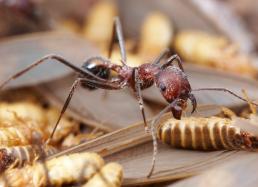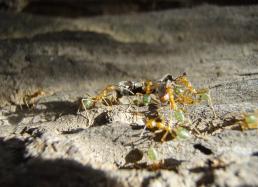Ants: Friends or Foes?
We've all endured the experience of an uninvited parade of ants intruding on a picnic. And it's true that certain species can become pests when they regularly forage through your home in search of food. But did you know that ants can be beneficial to both humans and the environment?
Ants & Pest Control: Many species of ants prey on the eggs and larvae of other bothersome household bugs such as flies, fleas, silverfish, bed bugs, and even cockroaches. If left to colonize the perimeter of your yard, ants can even act as a barrier to termites—their mortal enemies.
Ants & Agriculture: Some ants can also be an aid to agriculture. Many farmers use predatory species as inexpensive, natural, and effective biological control
agents. For almost 1,700 years in China, citrus growers have been nurturing Green Tree Ant colonies in their orchards to keep harmful insects off crops!
Like earthworms, ants also help create healthy topsoil. By digging nests and tunnels, ants aerate and turn over the dirt, bringing nutrients closer to the surface. Plus, their tunnels allow rainwater to circulate more fully through the soil.
In nature, seed-harvesting ants can even increase the dispersal, survival, and germination rate of seeds. How? By transporting seeds to new habitats and storing them in nutrient-rich ant nests where they can sprout in a safe environment, protected from seed predators as well as drought.
Ants as Environmental Indicators: The diversity of the ant population and the health of ant colonies in the wild can also act as an indicator of habitat health. Conservation groups often monitor ant communities to evaluate the impact of ecological disturbances and measure the success of restoration projects.
And perhaps one of the most intriguing ways ants can benefit the environment is through their genes. Stored within ant DNA is the record of how climate change has affected the diversity of ants throughout their long evolutionary history. Armed with this information, we can better predict how ants and other related insects that are vital in maintaining soil health, managing pests, and aiding in agriculture may respond to the current environmental challenges we face.




